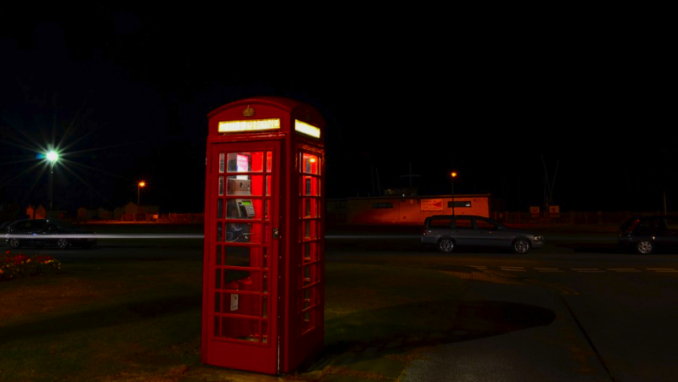
Red phone box at night,
williami5 – Licence CC BY-SA 2.0
“Silly old fart.”
Never slow to turn thoughts into words, Davies expressed that one from his side of our shared room, above a Sleescale corner shop, while sat in bed reading a three-day-old newspaper by torchlight. My bed is empty as I’m at the window desk doing paperwork with the help of my own torch.
Before me, the darkness was interrupted by frosty rooftops beneath which ran shiny wet cobbled streets. Above, the stars looked down. I recalled Camus’ quote of men who share rooms, prisoners or soldiers, developing a strange alliance through dream and fatigue. En cue, Davies read my mind.
“You can watch the Milky Way in your bed you know. No need to sit up all night. Line up the holes in the ceiling with the holes in the roof.”
In the pitch black of the loft space lay another ancient community, given away by scampering sounds, possibly pigeons or a jackdaw, hopefully not a rat. We do have electricity but it’s off, not because of striking miners and their picket lines but because of a hungry meter that devours too many of our fifty pence pieces. We sit in the cold and the dark.
“Love to, but I have to make notes from my interviews and phone them down to London,” I tell my roommate.
Davies prefers a brief oral synopsis from his paper. All week the media had been running with sentiments best summarised as, “Tory Old Guard Cautious about Strike.”
“Idiots. Haven’t learned the protocol have they? Or well briefed in it and are trying to wreck it. My bloody body on the line for that lot.”
Davies, and others, had been tasked to show the striking miners in a bad light by infiltrating their picket lines and causing trouble in front of the media. The plan was working, if anything the mixture was over-egged. Confrontations between the police and miners were very violent but appearing on the middle pages, not the front. Talk of compromise from wavering old guard politicians had captured the week’s headlines instead.
I’d been relegated to research, from which a pattern was emerging allowing me an opportunity to piece together an underlying hidden strategy. Adrenaline, fresh air and aching muscles helped my focus. I was beginning to feel the addictive “I’ve found out something you haven’t” thrill associated with being ahead of the newspapers and the unsuspecting old buffers in the political elite.
Before dark, we’d been on a run. Davies would sprint between one pair of lampposts and then jog between the next. He had a Scandinavian name for this, different every time he tried a pronunciation. Pack on back, running kit padded out with towels, he boasted an impressive sweat. As his training buddy, I’d been allowed to go at my own pace but worse was to come. At the weekend, we were to run to a neighbouring town and, on the way back, bivvy on the top of a hill. Davies, with more southern ways than mine, insisted it to be a mountain.
On the one hand, this was pencilled in on what was supposed to be my day off. On the other, the oxygen and adrenaline were sharpening me up. Did Camus also suggest that if you want something done, ask a busy person with shin splints and blisters? Maybe not. Reminded of that inconvenient thing known as countryside, I took my opportunity to say,
“Ask the colonel if I can have a lift the day after tomorrow. I need to go well out of the town for one of my next interviews.”
“Ask him your bloody self.” Davies mimicked my accent light-heartedly, “I need a taxi ride to tea and biscuits with Mrs lonely widow while the rest of you are knuckling with plod and the hardest knocks in Northshire.”
He read a comment from the newspaper which expressed another sentiment unlikely to appear on any road map leading to the defeat of our enemy.
“The former minister expressed his concern for the striking miner’s wives and hungry children. Dear God. Idiot.”
I addressed my notes while toying with my pen. I was uncertain how to phrase my next sentence. On my side of the battlefield, London preferred me to phone in solutions rather than problems. Since Davies was in the military, keen on all things that made loud noises, off his guard and lying in bed behind my shoulder, I put him to use.
“About bomb tests. Atom bomb tests.”
His own limbs aching, his adrenaline high and annoyed by the newspapers, the captain was more than happy to hold court.
“Bloody French bomb themselves in Algeria. Bloody yanks bomb themselves in Nevada, bloody Soviets in Noyo Zemlo, or whatever the name. There’ll be a desert in China-land turned to glass, probably downwind of a great city full of little kids. At least we have the better sense to blast the other side of the world.”
“Singapore?”
“Stop off en route to Easter Island, boom.”
He meant Christmas Island. More certain of the locations than their names, he puzzled over,
“Oz. Maralinga? Woomera?”
I could check later. There was an magnificent leather-bound atlas in Sleescale public library that should make sense of such things in the same way it helped to find coal fields, power stations and flying picket’s muster points.
“Were the men involved well protected?”
“Doubt it. Trench fodder. Are we well protected up here? Take a glance in the mirror.”
Before being moved to research, my attempts at picket line duty weren’t a great success. Having said that, my black eye was a lot better, sore ribs better still but the chipped teeth awaited a dentist.
It being the middle of the night, the phone line to London beckoned. I pulled myself up from my desk, folded my notes and searched for a jacket.
“Alley catting again?”
“Date with an empty phone box.”
“Ask London to send up a crate of foreign beer. And garlic bread. Hasn’t been invented up here. Sooner these corner shops are bulldozed and replaced by hypermarkets the better.”
Despite being a tall tough guy, Davies was weakened by some of the finer grocery advertisements in the broadsheets. It would be unfair to call the yearning ‘homesickness’, more a goading of the palate.
“Like living in a different century,” he remarked, “neighbours tried to talk to me yesterday morning. Godforsaken place.” By which time, I was out of the bedroom door and trotting down the carpet-less stairs towards the frosted glass front door.
***
The phone box had a certain ambience, especially at two in the morning. Think small cast-iron public lavatory with thick panes of glass, many of them missing. The phone book was missing too. Not that I needed one. I could remember both of the numbers I was going to call. One was official, drummed into me months ago, the other one a bit cheeky.
On the train down from Euston, I’d had a conversation with Davies that had concerned me. It had prayed on my mind, as thoughts of Italian side servings might unsettle the guardian of an empty stomach.
I began shovelling a pocket full of two pence pieces into the payphone. What was saved from the electricity meter perished here.
I dialled my first number, the one I wasn’t supposed to have found. Alone in my colleague Natasha Williams’s room in Dolphin Square (in what now felt like a different world and a different life), as instructed, I hadn’t tried on her clothes or used her shower. But I had, naughtily, noted the number on a dog and bone phone which sat at her bedside on top of a phone book. I held the receiver to my ear and listened to it ringing. Given the hour, I’d allow her a while to wake up and collect herself.
Phone books jogged a happy memory. My father was a very shy man. When we had family get-togethers, in my childhood home not far from Sleescale, he was too shy to recite a poem, or sing, or act a quick scene where he played all of the parts. Rather, he would send me or one of my cousins to bring him a phonebook from a call box and then tear it in two. Or he might put his mouth around the spout of a hot water bottle and blow into it until it exploded. My reminiscences were about to drift towards his tremendous victory as a last-minute entrant in a country fair piano smashing competition when I realised Natasha wasn’t going to answer her phone.
Out alley catting herself? Unlikely. I worried about her. From up here, there was one other thing I could do, to try to put my mind at rest, but first, duty called. I phoned my second number. Having connected immediately, I found myself listening to a cockney girl with a thick accent. She stated only the last four digits that I had dialled, wary of giving away extra information to a chancer or a wrong number.
To be continued…..
The Goodnight Vienna Audio file



